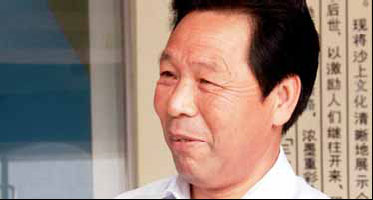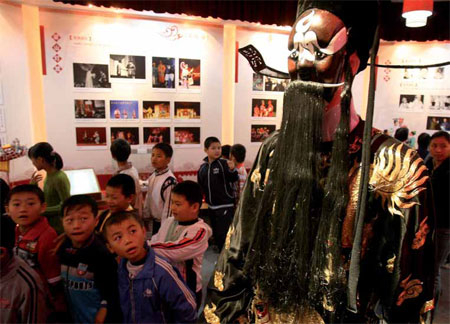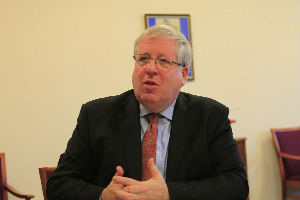Old man river rolls back to the roots
Updated: 2013-10-25 09:59
By Joseph Catanzaro (China Daily Europe)
|
|||||||||||
The battle to save Zhangjiagang's cultural heritage is something to sing about
There is something of the river in the old man's voice when he sings, a slow and subtle strength, an undercurrent deep in the baritone that tugs at the heart and gently sets memory adrift.
"In this land of sand, born in water, we built in the middle of nowhere," he sings.
Zhao Peixiang, 63, grew up on the banks of the Yangtze River in a thatch and wood house his great-grandfather built.
In a small room in bustling Zhangjiagang, Jiangsu province, he sings the songs passed down to him in childhood. He slips into another melody, a song they sang in the village on his wedding day, a near 1,000-year-old tune celebrating the first bloom of love.
But there is sadness about Zhao's eyes when his voice trails off. The village of his youth is gone. The home his parents built for him and his new wife exists only in the old man's memory. A port facility and a steel mill now stand where once children learnt the songs of Zhao's people.
The words and melodies that were handed down for 700 years and acted as a thread binding together life and community have fallen silent. The children of this disposed generation now work in factories and live in high-rise towers.
The fear of famine and the backbreaking labor in the fields that plagued Zhao as a boy are gone, and he says that's a good thing. But there is no place for harvest songs among the clanking and whirring of machines, and no call for the singsong blessing for a new building, when cranes and concrete now make what was done with hand and heart.
Not so long ago, Zhao says he feared the ancient words and melodies would die with him and the handful of elders that still remember them, a cultural casualty of China's rapid modernization.
But not anymore. When he smiles, the young people who have gathered to listen to the old songs, to learn and remember, smile back.
In the past 30 years, few cities in China can rival the explosive level of economic growth enjoyed by Zhangjiagang. Located on the rich alluvial plains on the final bend of the Yangtze River, steel mills and farms and a free trade zone have catapulted the city and its relatively small population of 1.3 million to the third-highest-ranked county-level city in China, in terms of comprehensive competitiveness.
But in the heady rush to economic greatness and industrial success, much of its ancient culture and heritage was forgotten.
Late last year, the city paused, and realized it was losing something worth fighting for. The battle to save Zhangjiagang's ancient cultural essence began.
The city's deputy Party secretary Ni Huifen, was one of the key players who began recruiting custodians of ancient lore and knowledge like Zhao.
The city has set aside 5 million yuan ($820,200; 599,400 euros) for a three-year project that aims to preserve and promote Zhangjiagang's traditional culture.
A research team has been established to collect and document songs, dances, stories and legends and other customs. The first cultural festival was held last October. So far this year, about 100 cultural events have been staged, attracting more than 70,000 in audiences.
"If we don't protect it, it's going to be lost," Ni says. "This is very old, and some of it has been lost to history already. Now the city is trying to recover these special art forms to protect them and save them."
She says the response from people in Zhangjiagang, young and old, has been overwhelming.
More than just history, the city's efforts were giving the population a renewed sense of identity and place.
"It makes the audience feel for their home, feel the changes in their hometown," Ni says.
Historically, the area in and around Zhangjiagang can be divided into three, distinct cultural groups.
Zhao's village, huddled in the north near the river, was a custodian of what is known as Shashang culture.
"It means 'on the sand'," Ni says. "It's called this because this area is on the curve of the Yangtze. The river flushes the sand up onto the banks. The city here before Zhangjiagang used to be called Shazhou, which literally means 'the land of sand'."
When Wang Rongjuan retired a few years ago, she decided to throw herself into preserving and promoting Shashang culture. She is now part of a 50-strong troupe that performs traditional songs, dance and stories.
"It's mostly made up of females, but we have 10 male members now," she says. "Most are people my age, but we have some young people, too."
Wang makes up one half of a duo that wrote, directed and performed a cultural show that was so popular it traveled to Suzhou, a major city in Jiangsu province.
"This is a very important job," she says. "People in the younger generation need to hear us sing. Our performances resonate with the local population."
Ni says one of the focal points for the cultural reclamation is a recently constructed arts center where custodians of the old ways can practice song and dance, perform for youngsters, and contribute to educational displays.
In memory of the old Shashang, beneath a raised glass floor in the lobby is a bed of sand. It is on this foundation of old and new, before a wall featuring photos of the river that runs through his past and into the present, that Zhao gives voice to ancient verse.
Forced to leave school when he was 13 to farm and help support his seven siblings, Zhao became a soldier when he was 18, but returned to the fields four years later.
"I miss the culture, but not the life," he says. "We were too poor. We didn't have money for clothes or shoes. Thirty years ago we lived in thatched houses."
Despite the hardships, he loved the way the family would come together and sing at the end of each day.
"I learned from my parents, from my relatives, when I was a kid. There were no films, so after work we would all sit together and chat, sing the songs and practice."
Zhao introduces his final song to a captivated audience: "This is the song of the harvest. We sing it when we are working."
The fields of Zhao's youth are gone, but in the shining eyes of his audience lies proof he is planting a seed of a different kind, cultivating the hearts and minds of a new generation, so that the old songs and words will flourish once again.
josephcatanzaro@chinadaily.com.cn
|
Above: The Yangtze River folk song and opera museum in Zhangjiagang. While experiencing explosive economic development, Zhangjiagang attaches importance to traditional culture. Below: Zhao Peixiang grew up by the Yangtze River and witnessed how the local culture faded with the economic tide. Qi Zhenlin / for China Daily |

(China Daily European Weekly 10/25/2013 page19)
Today's Top News
Mythbuster dispels fictions about China
Forum urges stableChina-Japan ties
NSA spying hurts US diplomacy
Carrier rocket sent to launch base for moon landing
Requirements cut for business startups
Study shows PM1 most harmful
Cold snap to sweep NE, N China
Paper apologizes for reporter's untrue stories
Hot Topics
Lunar probe , China growth forecasts, Emission rules get tougher, China seen through 'colored lens', International board,
Editor's Picks

|

|

|

|

|

|






